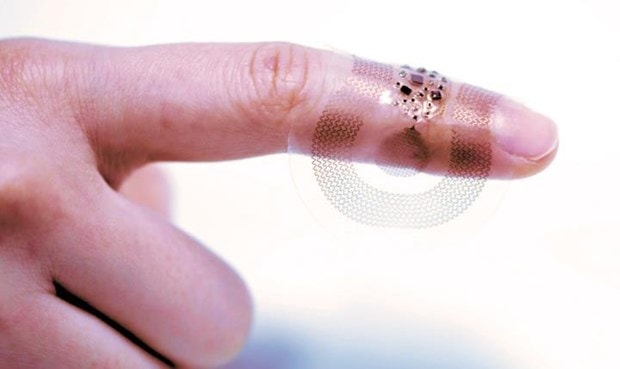New wireless sensor device fits the skin of premature babies
US researchers have invented wireless, ultra-thin, lightweight silicon sensors that are attached to the baby's legs and chest by a water-based glue that fits the delicate skin of premature babies.
 |
These devices are small in size, about 2cm and 5cm long. (Source: sciencenews.org) |
American scientists and engineers have just created an ultra-light sensor device that can help care for premature babies in the intensive care unit and ease the anxiety of parents when they see their children wrapped around many support tubes.
Typically, in the intensive care unit, each premature baby is supported by five sensors and electrodes to monitor heart rate, respiration, temperature and blood oxygen. With a series of devices worn on the baby's body, many parents feel worried about their baby's weak and fragile skin.
However, US researchers have invented wireless, ultra-thin and lightweight silicon sensors that are attached to the baby's legs and chest with a water-based adhesive that fits the delicate skin of premature babies. These devices are small, about 2cm and 5cm long.
The unique feature of these devices is that they do not use batteries and are powered by a tiny antenna placed under the incubator. This antenna also transmits data to a transmitter placed under the baby's incubator. This allows doctors and nurses to monitor the baby's health.
Researchers compared the accuracy of data transmitted from the conventional monitoring system with the new sensor system on 80 premature babies. The results showed that the data from both were consistent and accurate.
According to Professor John Rogers - Director of the Center for Integrated Bioelectronics at Northwestern University, due to their poor health, premature babies need special support from monitoring devices, but wearing many wires on their bodies will damage the baby's thin skin. He added that the research team has started working with pediatricians at Lurie Children's Hospital in Chicago, USA to find a new direction to support the care of premature babies since 2016.
Normally, babies born after 24 weeks have skin that is 40% thinner than full-term babies. Therefore, attaching many tracking devices to the baby's body with current glue will leave scars on the baby's body. The new sensor device of the scientists above has solved this problem.
The new sensor system is currently being tested in Chicago and is expected to be distributed to a pilot program in Zambia next April./.

